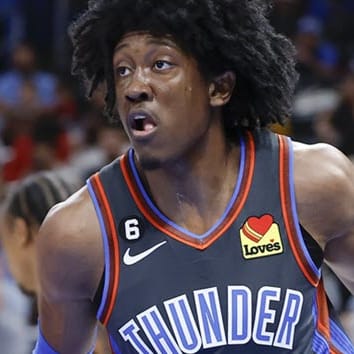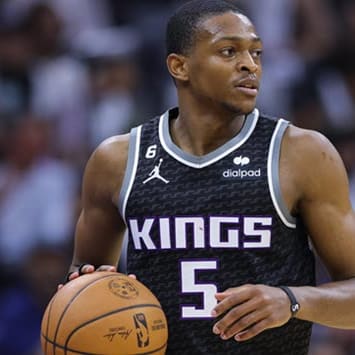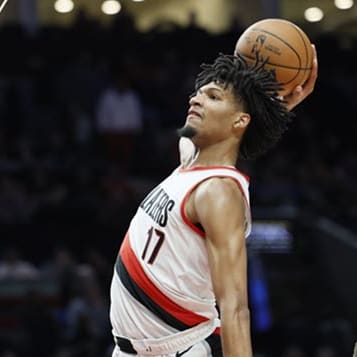This article is part of our NBA Draft Kit series.
Zach LaVine, Bulls
Chicago acquired LaVine as a key piece in the Jimmy Butler trade, despite the fact that he missed the second half of the season after tearing the anterior cruciate ligament (ACL) in his knee. ACL injuries have become commonplace in professional sports, especially in those that require sudden start and stop motions like basketball and football. The surgical procedure to repair the ligament has improved over time and a total ACL tear is no longer a career-threatening, or even career-altering, injury like it was in the past.
The recovery timeline has been reduced to eight-to-ten months in some cases, though NBA players over the last decade have averaged closer to 11 months.
The Bulls have already stated they will take the conservative approach with LaVine's recovery and expect him to miss the start of the year.
The decision may be frustrating for fantasy owners but should benefit LaVine's long-term health. Studies have shown total ligamentization -- the process that results in the surgically repaired ligament displaying the same physical properties as the original ligament -- can take up to a year to complete. Ensuring ligamentization has been completed is particularly important for a player like LaVine, who is dependent on his athleticism.
Jabari Parker, Bucks
Parker has a slight advantage in his recovery from his torn ACL, as he is familiar with the rehab protocol. The Bucks forward missed 61 regular season games over a two-year span after initially tearing his left ACL and missed the final 31 games of the 2016-17 campaign after re-tearing the same ligament.
Re-tearing an ACL isn't completely unheard of. Former Bucks All-Star Michael Redd endured a similar scenario. However, Parker has an edge that Redd did not: age. Redd was 29 and 30 when he suffered his injuries while Parker's injuries occurred at ages 19 and 21. A review of recent ACL tears in the NBA suggest age is a major factor in recovery. A majority of the players who sustained an ACL tear before the age of 23 went on to have a career-best PER after their surgery. Parker should be back in action around the All-Star break and is targeting a February return.
Joel Embiid and Ben Simmons, 76ers
One of the biggest limiting factors of "The Process" has been injuries to the young stars drafted by the Sixers. Some of the assumed risk was by design as questions about Embiid's foot were apparent on draft night, though no one foresaw the foot injury Simmons sustained prior to last season. Now both players enter the season with durability concerns.
Embiid missed his first two professional seasons while recovering from multiple procedures to address a navicular fracture in his foot. The boat-shaped bone of the midfoot held up throughout the 2016-17 season, but Embiid's rookie year was prematurely ended by a torn meniscus in his knee. A meniscectomy was performed to remove the damaged cartilage, setting up a quicker recovery.
His return to the court remains fluid, but he enters training camp still seeking clearance to resume 5-on-5 drills. Philadelphia will continue to handle Embiid conservatively and he will enter the season as an inherently risky fantasy investment.
Simmons is waiting to make his NBA debut after missing all of last year with a fractured fifth metatarsal in his right foot. Fifth metatarsal fractures are an increasingly common injury in the NBA and are accompanied by a lengthy recovery. Secondary procedures aren't unusual, though there has been nothing to suggest that Simmons' slow-to-mend bone needs additional work. He should be back for the preseason and will hope to follow the precedent set by players like Kevin Durant and C.J. McCollum, who suffered the same injury and returned to an elite level of play.
Blake Griffin, Clippers
The Clippers signed Griffin to a five-year contract extension, despite a laundry list of injuries. The five-time All-Star has missed time with a stress fracture in his knee, a torn meniscus, a broken hand, and a partially torn quadriceps. Now Griffin enters the year recuperating from offseason surgery to address a torn plantar plate in his right foot. The plantar plate is a fibrous band of connective tissue located in the area between the bones of the foot and the toes. These plates are vital in weight-bearing and help stabilize the toes.
Griffin's injury involved the plantar plate in his big toe, a key component in dynamic foot motion. Fortunately, his recovery went smoothly and Griffin was an active participant in the first days of training camp. He will continue to play with an elevated level of inherent injury risk, but Griffin remains a high-upside fantasy commodity.
Isaiah Thomas, Cavaliers
The health of Thomas was a major talking point this offseason as concerns about his problematic hip held up the trade that eventually brought him to Cleveland. Thomas missed the end of Boston's 2017 postseason run after aggravating a hip labrum injury.
The primary joint in the hip is known as the acetabulofemoral (AF) joint. Here, the head of the rounded head of the femur sits in the acetabular groove of the pelvis. The head of the femur can freely pivot on acetabulum allowing for a large degree of mobility. This large amount of movement comes at the cost of stability, which is where the labrum becomes a factor. The labrum deepens the acetabulum without limiting motion. The surrounding musculature and ligaments work with the labrum to add additional support. Unfortunately a direct impact or undue repetitive motion can result in the labrum tearing or fraying. Anatomical variance in the area can also contribute to the problem, resulting in an impingement of the labrum. These injuries are often painful and result in limited mobility.
Thomas admitted there is a degree of impingement in the area but he opted not to treat the injury with surgery. Instead he will rehab the area in hopes of regaining stability by focusing on the neighboring musculature. He is expected to miss the first two months of the season but hopes to be back by Christmas. However, concerns about his long-term durability remain warranted, hampering his overall fantasy value.
Russell Westbrook, Thunder
The reigning MVP enters training camp with two new All-Star teammates and minor concerns about his knee. Westbrook, who has previously undergone multiple surgeries on his opposite knee, recently received a platelet-rich plasma (PRP) injection on his left knee. The reason for the treatment has not been revealed, though the technique can be used to treat a number of issues.
A PRP injection is derived from the athlete's own blood. The sample is taken and broken down in a machine known as a centrifuge. This separates the various components of the blood, leaving behind a protein-concentrated mixture that is injected into the injury site. The PRP mixture is filled with platelets, the primary factor of blood responsible for clotting. The hope is that by increasing the platelet count the body's natural healing response will be stimulated and work more efficiently.
The cause for concern around Westbrook should be minimal and he should be back in time for preseason action. Furthermore, the presence of Paul George and Carmelo Anthony should help ease Westbrook's workload and help reduce wear and tear on his body after a record-setting 2016-17 season.











